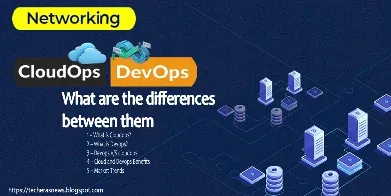In today’s fast-paced tech world, CloudOps and DevOps are among the most in-demand and transformative practices in IT. While they both aim to improve how businesses build, deploy, and manage applications, they serve distinct purposes and offer unique benefits.
Let’s break them down, side-by-side, to help you understand what sets them apart—and how they work even better together.
☁️ 1. What is CloudOps?
CloudOps, short for Cloud Operations, refers to the set of practices, tools, and workflows used to manage cloud-based infrastructure and services efficiently.
It involves:
-
Optimizing cloud service performance
-
Automating cloud resource management
-
Ensuring availability and security
-
Monitoring cloud workloads and traffic
-
Managing cost and compliance
CloudOps is crucial for businesses that have adopted public, private, or hybrid cloud platforms like AWS, Azure, or Google Cloud. It enables business agility, making it easier to scale and respond to changing demands in real time.
✅ Related Read: Top 10 AI Tools Shaping the Future
🔧 2. What is DevOps?
DevOps is a collaborative software development approach that merges Development (Dev) and Operations (Ops) into a unified workflow. Its goal is to shorten the software development life cycle while delivering high-quality software continuously.
Core DevOps stages include:
-
Continuous Development
-
Continuous Integration (CI)
-
Continuous Testing
-
Continuous Deployment (CD)
-
Continuous Monitoring
DevOps emphasizes automation, collaboration, and agile delivery, enabling faster software releases and reduced downtime.
🔍 Tip: Tools like Jenkins, Docker, and Kubernetes are central to DevOps workflows.
⚔️ 3. CloudOps vs. DevOps: Key Differences
Feature CloudOps DevOps Focus Infrastructure & cloud service optimization Application development & delivery Main Goal Scalability, reliability, and cost-efficiency Speed, quality, and collaboration Scalability Dynamic resource scaling (auto-scaling) Code-based scalability through CI/CD Accessibility Remote access and centralized control via cloud Requires lifecycle-level design accessibility Affordability Cost-efficient with pay-as-you-go cloud pricing High upfront cost due to skilled talent/tools Automation Automates cloud workflows Automates dev-to-deployment lifecycle Resource Management Shared resources across cloud environments More restricted to project-based infrastructure Disaster Recovery Built-in with most cloud platforms Requires separate implementation Backup & Recovery Auto backups and redundancy via cloud Needs custom solutions or DevOps tools
🔗 4. Cloud + DevOps = A Powerful Combo
Integrating DevOps practices with CloudOps strategies leads to a powerful, future-ready IT environment. Together, they offer:
🚀 Increased agility
🔐 Improved security and compliance
🔁 Continuous improvement and feedback loops
🧰 Automated resource management
🌍 Global scalability and collaboration
🔄 Streamlined change and version controlA
Also Check Out: 9 Brands That Nailed Digital Transformation
📈 5. CloudOps & DevOps Market Trends (2025)
The demand for CloudOps and DevOps professionals is skyrocketing in 2025. Here are the latest insights:
-
The DevOps market is projected to hit $12.85 billion USD by the end of this year.
-
90% of enterprises now adopt a multi-cloud or hybrid cloud strategy.
-
Automation, AI integration, and cloud-native development are driving new growth.
Popular platforms like AWS, Microsoft Azure, and Google Cloud now offer built-in DevOps toolkits, further blurring the line between DevOps and CloudOps.


